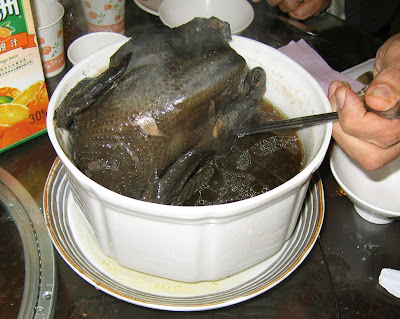I know this sounds more like a post on exercising, but really it’s about food. Over the Chinese New Year I was invited to a number of traditional Chinese New Year meals.
There are a number of foods that are traditional to Chinese New Year. Many of the foods that are eaten have a purpose. They are representative of something. Here is a list of Traditional foods for Chinese New Year.
Mustard greens – They are served as a vegetable and they represent long life. The eating of Mustard greens is a wish for the long life of those eating the meal with you.
 |
| Taiwanese Black Chicken |
Fish – The Chinese word for fish is Yu, which is pronounced the same as the word for abundance. It is noted that although every family prepares fish, it is symbolic to not eat all of it as this ensures you leave something for the remainder of the year.
So nearly every Chinese New Year meal includes these foods. I was invited to three Chinese New Year meals this year and all of these things were included in each one. But there was one other common food that was served. It is a special dish that is peculiar, I think to Taiwan, and it’s called “Buddha Jumps Over the Wall,” or in Mandarin Fo Tiao Qiang (phonetically: Fwu Teeow cheeahng). There is a story that goes with the name:
A Fu Zhao scholar was picnicking with friends. He took all the food that he had, put it in a wine jar and heated it over a fire. The smell drifted off the food and across the landscape until it reached a Buddhist monastery. The monks smelled the food and couldn’t resist inviting themselves to the picnic. So they jumped over the wall and descended upon the picnic. A poem was written to commemorate the meal. There was one line that was written in praise of the food that went like this, “Even Buddha himself would jump over a wall to taste this dish.” I didn’t realize that Ancient Buddhist Monks were such poetic souls.
So what is Buddha Jumps Over the Wall? It’s a form of Shark Fin Soup. There is an extensive list of ingredients.
Shark’s Fin, Abalone, Quail Eggs, Chicken, Ginger, Dry Sherry, Bamboo Shoots, Lamb, Pork, Ham and black Mushrooms.
That’s a lot of different ingredients, but here’s the real story! These things are added on the first day. It takes two days to make this soup:
On the second day you add Chinese Turnips, Carrots, Cinnamon Sticks, Anise, Chicken Stock, more Sherry, double dark Soy Sauce, Bamboo leaves, and a large Lotus leaf.
Apparently, you just walk through the traditional market and ask for one of everything. I think the reason it takes two days is because no one has a pot big enough to cook it all at once.
 |
| Buddha Jumps Over the Wall |
Now for the thing for which you’ve all been waiting. Is it tasty? If you know me or you’ve read this blog for a while you probably will guess that I’ll eat anything, at least once. My philosophy is that if they eat it somewhere in the world it must be good to eat. Well, when I say good I mean it probably won’t kill you. I don’t like everything I try and I’m way too polite to say, “I wouldn’t eat that if it was the only thing between me and starvation.” I generally, eagerly try whatever is placed before me. But I wouldn’t be honest if I told you that I would jump over a wall for this soup. I think that Shark Fin is a little too strong flavored for me. Buddha seems to enjoy it more than I do.
Note: I have to get better at taking my camera with me everywhere. I sometimes feel that its rude to whip out my camera and start shooting the food and the people so I keep it put away or don’t bring it. Then I have “borrow” from other blogs to get the pictures.I always try to give credit. I may infringe copyrights but at least I’m polite about it.

Chris Banducci is a pastor and missionary in Taiwan. He has, at other times of his life, been a white-water rafter, rock climber and adventurer. He left the corporate world of Solid Waste Recycling in 1996 and went into full-time ministry, where he pioneered a church in Riverside, California for the Potter’s House Christian Fellowship and is now engaged in the same endeavor in Taoyuan City, Taiwan. He writes on the culture, religion, tradition, and day-to-day life in Taiwan. Twenty-six years of living with Muscular Dystrophy may have weakened his muscles but not his spirit.








